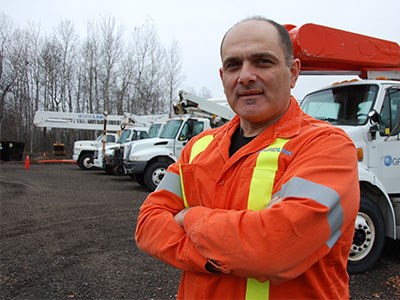Good things are in storage for Grid Link Utility Contracting of Thunder Bay.
The expanding company recently moved from a cramped 3,000-square-foot shop near the waterfront in Port Arthur to a spacious 42,000-square-foot building on the city’s outskirts that once housed GRK Fasteners on Rosslyn Road.
The move was long overdue, and demonstrates their evolution from starting out as primarily a power-line company to a more service-oriented, contractor for its customers.
“We now have the ability to park things indoors, which is crucial for us,” said controller Jeff Heney.
With a fleet of about 40 bucket trucks, excavators, loaders, dump trucks and bore-hole drilling equipment, space was at a premium at their former Clavet Street digs. It forced the company to rent space around town, including at Keefer Terminal on the waterfront, to store equipment.
“We had indoor storage for one unit, the hydrovac truck, which freezes if not kept indoors,” said Heney. “That took up the entire space indoors all winter. Now we have five bucket trucks indoors, ready to go in case of emergencies, rather than having to show up early and heat up the trucks in the morning.”
The company was established in 2000 but the growth spurt has only occurred in the last three to four years. Powerline transmission work has always been the company’s bread and butter, but it was a chore to continually drum up that kind of work in the region.
Company owner and president, Jody Bernst, a former Thunder Bay Hydro lineman, made a bold decision to buy out his original business partner and pour more capital into equipment to secure more diverse civil work.
“It’s ownership’s willingness to take risks and keep reinvesting with a vision for growth,” said Heney. “Every year, our main customers have given us a bigger piece of the overall jobs they run.”
For their largest customer, TransCanada Pipelines, it’s meant expanding beyond pole work to becoming TransCanada’s prime regional contractor, which involves digging up and replacing the anodes in their cathodic protection system, a method used to protect underground pipelines from corrosion.
For Canadian Pacific Railway, Grid Link is erecting crossing signals, installing culverts, hauling ballast, delivering timbers and brushing out vegetation.
To that end, the company has made a sizeable investment in Hy-Rail equipment by retrofitting bucket trucks, digger derricks and purchased basic track maintenance trucks to assist with infrastructure work and derailments.
“What we’re trying to offer these companies is a one-call service,” said Bart Foglia, Grid Link’s business development manager. “We try and do everything in-house and keep all our people working.”
The bulk of their work is within 400 kilometres of Thunder Bay, but there are no self-imposed boundaries.
“We have no borders,” said Foglia. “We’re governed by our client.”
Their core workforce of 30 expands to more than 50 during the warm weather months. As a unionized shop, hiring additional linemen to take on larger projects is only a phone call away.
“My philosophy is to get the work first,” said Foglia. “We’re always looking for good people who can offer us something we can use now, or help us to get something else. We don’t close the door on anything.”
When Hurricane Sandy devastated the New York-New Jersey area in 2012, Grid Link answered the call for help and dispatched a dozen employees and their trucks to Staten Island and Vermont to assist in the restoration efforts.
Grid Link takes great pride in promoting a culture of safety and in being the first company in northwestern Ontario to attain a nationally-recognized COR (Certification of Recognition) safety designation in 2012. Being an approved safety contractor always resonates well with customers, said Foglia.
Future plans, Foglia said, are to focus on steadily expanding their range of services, including adding more electricians, and gradually growing their presence geographically.
Building solid relations with First Nations by training Aboriginals is vitally important for the work they do.
For a contract with Quebec-based Axor Group in the Beardmore area, which involves stringing a transmission line to a hydroelectric dam now under construction, Grid Link has hired four Aboriginals from the nearby First Nations, with a fifth apprenticing as a crane operator.
In the mining industry, they’ve been involved in sub-station construction and perform regular high-voltage and maintenance duties for operations at Lac des Iles and the Williams mines, but want to take on larger projects in that sector.
As a contractor with power-line technicians on staff, “it would make us one of a kind in this region,” said Foglia.




